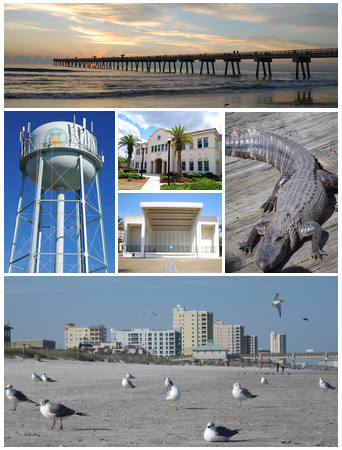
Moving to Jacksonville Beach, Florida: A Comprehensive Relocation Guide
Considering moving to Jacksonville Beach, Florida? This vibrant beach city offers surf culture, diverse dining, and convenient location. With approximately 24,000 residents in 2025, Jacksonville Beach combines coastal living with easy access to Jacksonville’s employment centers and urban amenities.
Demographic Profile to Consider If Moving to Jacksonville Beach:
Jacksonville Beach’s 2025 population is approximately 24,000 residents on this barrier island east of Jacksonville. The median age is around 39 years, with young professionals, families, surfers, and retirees. The population is approximately 88% White, 7% Hispanic, creating a predominantly middle to upper-middle class beach community. Jacksonville Beach features neighborhoods from beachfront properties along the Atlantic to inland residential areas west of Third Street. The downtown area along Beach Boulevard offers restaurants, bars, and shopping creating a walkable district. The community embraces surf culture with an active beach lifestyle. Jacksonville Beach appeals to those seeking coastal living with urban job access, combining beach town atmosphere with metropolitan connectivity. Find trusted local services for moving, living, and working in Jacksonville Beach.Jacksonville Beach Relocation Directory
Cost of Living to Consider If Moving to Jacksonville Beach:
Jacksonville Beach offers moderate to upper-moderate costs for Atlantic Coast living. Median home values range from $450,000 to $600,000 in 2025, with beachfront properties commanding significant premiums. The median household income is approximately $75,000. Rental properties average $1,900 to $2,600 monthly. Florida’s absence of state income tax benefits residents. Overall cost of living is competitive for beachfront communities, with Jacksonville Beach providing relative value compared to South Florida while offering similar ocean access. The city’s proximity to Jacksonville employment creates strong housing demand. Costs vary significantly from oceanfront to inland neighborhoods, providing options for various budgets seeking beach lifestyle.
Economy and Job Market:
Jacksonville Beach residents typically commute to jobs in Jacksonville, one of Florida’s largest cities. Major employers include Naval Station Mayport providing military and civilian employment, Mayo Clinic Jacksonville, Baptist Health, Bank of America, CSX Corporation, and numerous financial services firms. Many residents work in healthcare, finance, military, logistics, and professional services. The beach area itself supports tourism employment with hotels, restaurants, and surf shops. Some residents work remotely or own local businesses. The broader Jacksonville metro offers diverse opportunities across all sectors. Typical commute times to downtown Jacksonville or Southside range 20-35 minutes. The beach community supports entrepreneurship and small businesses.
Education:
Duval County Public Schools serves Jacksonville Beach students with schools including Fletcher High School, Duncan U. Fletcher Middle School, and several elementary schools. The large district operates throughout Duval County with magnet programs and choice schools. The University of North Florida in Jacksonville offers comprehensive four-year programs. Jacksonville University and Florida State College at Jacksonville provide additional higher education options. The school district serves the beach community adequately, with families often considering school quality when selecting neighborhoods.
Recreation and Lifestyle:
Jacksonville Beach offers miles of Atlantic Ocean beaches with consistent surf conditions attracting surfers year-round. The Jacksonville Beach Pier provides fishing and ocean views. The downtown area along Beach Boulevard and First Street features diverse dining from casual beach bars to upscale restaurants, craft breweries, and live music venues. Residents enjoy surfing, beach volleyball, fishing, and water sports. SeaWalk Pavilion hosts concerts and events. The area’s surf culture creates an active, health-conscious community. Nearby Hanna Park offers camping, trails, and freshwater lake. The Beaches Town Center provides shopping and services. Annual events include Springing the Blues festival. The community balances beach lifestyle with nightlife and dining options. Golf courses serve residents. The subtropical climate enables year-round beach activities, though winter temperatures are cooler than South Florida.
Healthcare and Services:
Jacksonville Beach residents access comprehensive healthcare through Baptist Medical Center Beaches providing full-service hospital care. Mayo Clinic Jacksonville and other major hospitals in Jacksonville offer specialized care. Numerous medical offices and urgent care centers serve the beach communities. The Jacksonville region’s extensive healthcare infrastructure ensures quality medical access.
Transportation:
Jacksonville Beach is connected to Jacksonville via Beach Boulevard (State Road 212) and Atlantic Boulevard (State Road 10), with the Intracoastal Waterway bridges providing beach access. Jacksonville International Airport is approximately 35 minutes west. Jacksonville Transportation Authority (JTA) operates bus routes serving the beaches. Most residents use personal vehicles, though the downtown beach area offers walkability. Bicycles are popular for local travel. Typical commute times to Jacksonville employment centers range 20-40 minutes.
Conclusion:
Moving to Jacksonville Beach in 2025 offers Atlantic Coast living with surf culture, diverse dining, and convenient Jacksonville access. The city’s combination of beach lifestyle, active community, and metropolitan connectivity makes it ideal for young professionals, families, and beach enthusiasts seeking coastal Florida with urban employment opportunities.

